
What is hinduism-An overview
Hinduism is commonly known by its Sanskrit name ‘Sanatana-Dharma’. According to Puranas, Sanatana dharma was the only culture of all seven continents in ancient times but due to the rise in evil desires and dominant attitude of demons/invaders, this culture gradually diminished everywhere. India is the only country where this culture remained intact though india has lost more than 70% of its original territory. Sanatana dharma survived in India for more than million years because of the Spirituality practiced by Indian sages who were not interested in materialistic greed,desires, pleasures and comforts.
The purpose of Sanatana dharma is to make humanity realize their inner divinity and its relationship with supreme divinity. Sanatana dharma has various scriptures that serve as a manual to spirituality. Just like you get a manual that explains the working of an appliance, god has gifted us a manual in form of Vedas/gita/Upanishad etc that explains the true realities of this materialistic world and guides us to spirituality.
Fundamental principles of Hinduism
The following four principles are the fundamental beliefs of Hinduism
1) Kama - Physical or emotional pleasure that gives birth to your next generation.
2) Artha - Power, fame and wealth to ensure the better future of your descendants,society and nation.
3) Dharma: Dharma is said to be the grandest of all four principles. Dharma is the set of ethical duties, practices and responsibilities that governs the moral/religious laws and mode of conduct on every level of spiritual advancement. Abiding to dharma means following the true eternal path. Dharma alone can guide the soul to infinite bliss and salvation. With maturity, one learns to govern Kama and Artha within the framework of dharma. Karma (deeds) defines your Dharma.
4) Moksha: The only true goal of our life is the liberation from this materialistic world. i.e getting liberated from the cycical process of birth and death.

Stages of human life
Hindus have the freedom to live either a household life or an ascetic life. Both the paths are equally glorious if followed religiously. The lifestyle of Hindus can be divided in four stages
Brahmacharya or bachelorhood (1 to 25 years): This is the stage of learning and growth. One should undertake spiritual lessons from a bonafide guru, build up his body, mind and senses to face the responsibilities of next stage.
Grihasthya or householder (25 to 50 years): One should marry and fulfill his household duties. Additionally, one should strive to earn artha i.e money, valor and honor following the paths of good karma (deeds) and dharma (righteousness). The karma (Cause effect law) we do in our current life will not only decide the destiny of our current life but also the fate of all our future births. By future birth, I mean Hindus believe in the reincarnation of soul until the soul undergo penance for the committed wrong sins after which the soul is eligible for moksha i.e liberation from repetitive cycle of birth and death.
Vanaprastha or forest life (50 to 75 years): This is the stage of gradual detachment from the materialistic world. One should hand over household duties to his/her sons/daughters and should spend more time in practicing austerities and making holy trips/pilgrimages.
Sanyasa or renunciation (75 to 100 years): This is the stage of complete renunciation from the materialistic world. One should go into seclusion mode, should do meditation in the forest to invoke our divine consciousness and then peacefully give up the body to attain either salvation or take birth in higher forms of life.
The Four Holy books of Vedas
Hindus have many scriptures but Vedas are said to be of utmost authority. All other scriptures are said to be derived from Vedas. For Ex: Upanishads are corollaries of Vedas.
<>
These Four Vedas are
1. Rig Veda: This is the longest and oldest of all Vedas. This book contains various hymns in praise of the gods.
It also has reference to conflicts between the Vedic people (called as Aryans) and their enemies called as ‘mlecchas’ or ‘Dasa’
2. Yajur Veda - This book contains various hymns on explanation of liturgy and rituals followed by Vedic sages and seers.
3. Sama Veda - Hymns of this book is especially chanted in special ceremonies in which the juice of soma plant is mixed with milk and other special herbs as the offerings to various deities.
4. Atharva-Veda: Last of all Vedas, this Veda consist of hymns especially dedicated to deity ‘Agni’.
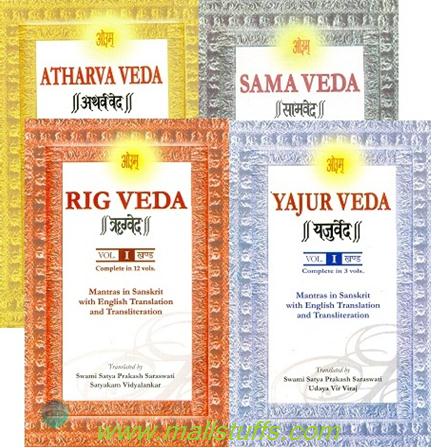
Different sects of Hinduism
Different sects of Hinduism worship the same universal Brahman by different names. This is why Vedas says “Ekam Sat, Vipra Bahuda Vadanti”, meaning “God is one, but the sages call him by many names”.
Smartism: Most of the Hindus belong to this sect. Smartism school of taught is used to represent Hinduism by Supreme court of India. This branch of Hinduism believes all deities including goddesses as various forms/manifestations of the same universal Brahman.
Vaishnavism: This sect of Hinduism believes lord Vishnu as the supreme universal god and all other deities as his manifestations.
Followers of lord Vishnu is called as Vaishnavites
Saivism: This denomination of Hinduism believes lord Shiva as the supreme universal god and all other deities as his manifestations. Followers of lord Shiva is called as Saivites
Shaktism: This branch of Hinduism believes Shakti or Goddess as the supreme universal mother of creation. i.e Goddess is worshipped as the supreme universal Brahman.
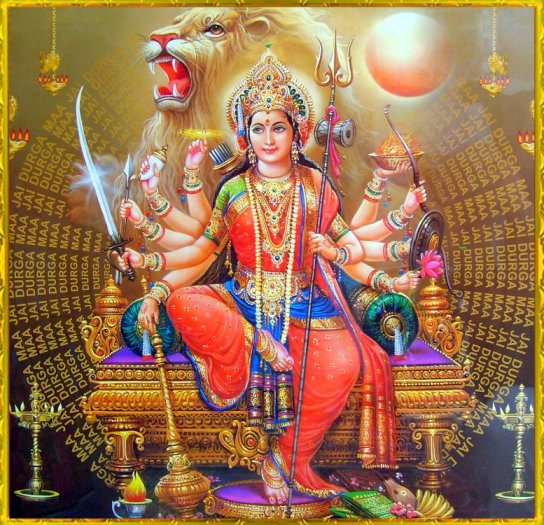
Goddess Durga - Supreme universal mother
She is also considered as the mother of all deities including Vishnu, Shiva and Brahma.
Also read Is Goddess Durga the supreme universal mother
Is god female-Yes or No
Varna System
Varna system was wrongly depicted as caste system by western historians to denigrate Hinduism. Varna system defines the four orders of human beings. Depending upon the skills and talent of an individual, he was grouped in one of the four Varna.
Brahmins: Priests
Kshatriyas: Military warriors
Vaishyas: Businessman or merchants
Shudras: Labor or servants
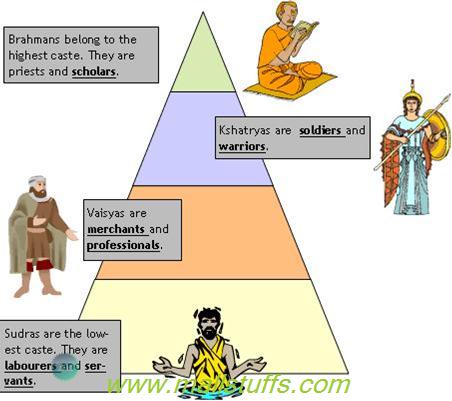
Brahmins and kshatriyas often exploited Vaishyas and Shudras to demonstrate their false supremacy similar to the exploitation of employees working under a manager/boss.
<>
Varna System-Caste System is the need of society
Vedas Quotes Against Present Caste System
Why Dance worship in hinduism
Common questions and myths of caste system
Bhagavad gita quote against caste system
Example of historic examples against present caste based system
Ill effects of caste system
Caste system in modern india
Tolerance and non-violence
One of the most important beliefs of Hinduism is Ahimsa or non-violence. Ahimsa means “absence of desires to harm others”. Since Hindus believes in divinity of all living creatures, they practice ahimsa to love and adore all animals. This is the reason why most of the true Hindus follow vegetarianism.
According to bhagavad gita, Garv(Pride), Darpa(arrogance), kruratva(cruelty), Krodh(Anger) and dvesha(hatred) are the enemies of humanity and are said to be demoniac qualities. Sanatana dharma encourages its followers to seek moral and ethical truth from wherever it comes from. So, Hindus are open to positive aspects of Christianity, Islam and other major religions. Hinduism view of universal brotherhood and willingness to accept individuals and beliefs of all faiths, religions, caste, creed etc, makes it the highly tolerant belief system.
Also read Why hinduism is the most tolerant religion and Why hindu intolerance is rising in india
World greatest freedom fighter ‘Mahatma Gandhi’ is known for his teachings on tolerance and non-violence. He often quoted the below verse from chandogya Upanishad.
Om sarve bhavantu sukhinah. Sarve santu niraamayaah.
Sarve bhadraani pashyantu. Maa kaschid dukhbhaag bhavet.
Translation
May all beings be happy, healthy and prosperous. May none in the world suffer?
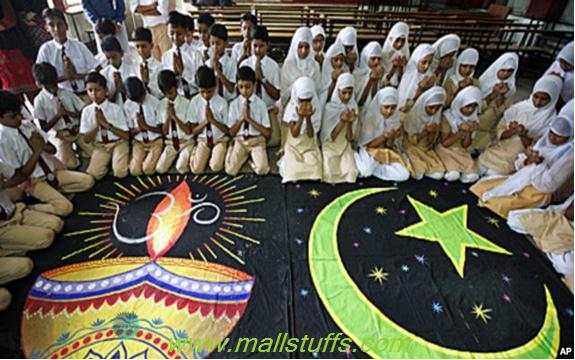
Example of hindu - muslim unity
Everything is divine in Hinduism
Everything is considered as divine in Hinduism. Plants and animals are considered as divine because of their crucial role in maintaining the ecological balance of our earth. Plants are worshipped for they provide us with shelter, food and oxygen. Even the natural elements like river, air, fire, mountains, water, sun, planets, and minerals are considered as divine in Hinduism. Cow is the most sacred animal in Hinduism since it is the best substitute for mother milk. Tulsi is the most sacred plant in Hinduism.
<>
Also read Why Animal worship in hinduism and Why cow is sacred to hindus
No conversion in Hinduism
Just like all streams and rivers reach the same ocean, Hindus believe that all true religions reach the same supreme god. Since worship of any divine being leads to the same god, Hindus don’t try to convert anyone to their faith. We don’t have any missionaries that go from nation to nation to convert poor souls to Hinduism. Concept of conversion is not found in any of the Hindu scriptures.
Religious Symbols
Aum: This is the most sacred symbol of Hinduism and so, is suffixed or prefixed in all mantras and devotional songs. Om is said to be the sound of universe. It is believed that this universe emerged from Aum symbol. Thus, Om represent the supreme universal Brahman.
Swastika -This is the symbol of Arya or nobility. It stands for sun that gives light in all four directions. It also stands for truth, stability and harmony. This symbol is found all around the world which proves the existence of ancient Aryan culture across all continents.
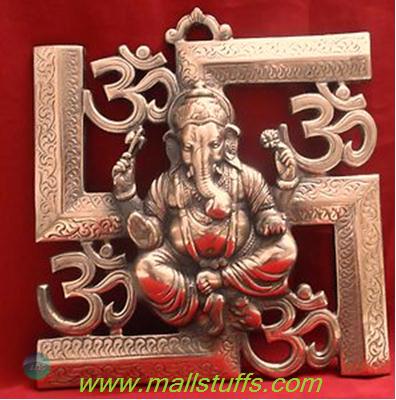
Lord Ganesha surrounded by sacred symbols ‘Om’ and ‘swastika’
<>
Also read Meaning and significance of Swastika-Hinduism sacred symbol
Swastika-Most sacred symbol of all ancient civilization
Only one divine god
Hinduism does not believe in one personal god or in a god having only one form. Since god is almighty, he can have any form, he can have many forms, he is Omni-present, he is unmanifested, he is transcendental, he is all knowing, he is all protecting etc...Most of the Hindus worships all manifestations(Gods/Goddesses) of the same supreme divine being. Note the key point here. Unlike all other religions, Hindus also sees divinity in female form of supreme Brahman. According to Vedas, “He is the God of forms infinite in whose glory all things are-smaller than the smallest atom, and yet the Creator of all, ever living in the mystery of His creation. In the vision of this God of love there is everlasting peace. He is the Lord of all who, hidden in the heart of things, watches over the world of time”. Thus, Hindus have the right to worship god in any form and so can go to any church, mosque, synagogue etc. Worshipping different manifestations of the same god should not be confused with polytheism. Worshipping the supreme in any form is a concept unique to Hinduism.
<>
Also read Why all gods are born in india
How many Gods in Hinduism
Atheist Hindu
In Hinduism, there is no authorized person to dictate the do and don’t of Hinduism. So, nobody can compel you to accept any god. Hinduism gives you the liberty to not believe in god and yet be called as a Hindu. Unlike other religion that wants you to stick to rigid dogma and doctrines, Hindus are free and are not threatened or punished for living life as an atheist.
<>
Follow any religious book
Hinduism lays importance on directly experiencing the supreme Brahmans rather than listening to any authority. Hinduism is the only religion that is not based on any single event or was founded by any one prophet. Unlike other religion where the book of truth is delivered from a single agent/prophet, Hindus don’t have any such one book as the point of authority. There are many religious books like Vedas, Upanishads, puranas, Dharma shastras, mahabharat, Ramayana, gita etc and everyone has the right to agree or disagree with the teachings of these religious books. In fact, Upanishad and gita are full of critical debates where the lord/guru answers the queries of the devotees.
Hindus believe this world as one big family
Hindus don’t consider followers of other cultures, race or faiths as competitors, enemies or outsiders. Unlike other religions that divide peoples, Hindus believe in Vasudhaiva Kutumbakam, meaning “world is one big family”. It’s the human fault to treat all living beings unequally. In the eyes of god, every being is divine and were created equally. So, we say
“Sarve Bhavantu Sukhinah”, meaning “May all living beings live happily in peace and prosperity”
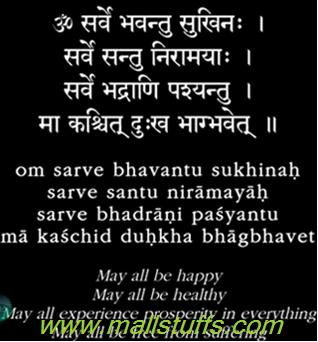
Rituals and Idol worship
Ritual and beliefs of Hindus varies from region to region. Most of the Hindus worship idols of gods in home or temples and offers
Coconut, incense sticks, fruits, flowers, oil lamps, camphor etc. Singing, dancing and chanting mantras is common to all Hindus.
There are more than 33 million deities in Hinduism all of which are worshipped as idols. Most famous of all mantras is gayatari mantra from Rigveda
“We meditate on the transcendental glory of the Deity Supreme, who is inside the heart of the earth, inside the life of the sky,
and inside the soul of the heaven. May He stimulate and illumine our minds“ Rig-Veda 3.62.10
<>
Also read Why gayatri mantra is the most powerful mantra
Why Idol worship in hinduism
Reincarnation
Reincarnation is the core belief of Hinduism. Hindus believe in the continuous reincarnation of soul until the soul undergo penance for the wrong sins after which the soul is eligible for moksha i.e liberation from repetitive cycle of birth and death. i.e Your life in this birth is the balance sheet of karma performed by your soul in previous birth. Reincarnation is very closely related to karma. After death, soul leaves the physical body and evolves in the unseen world, enjoying or suffering the result of his actions until it is born again in new physical body.
<>
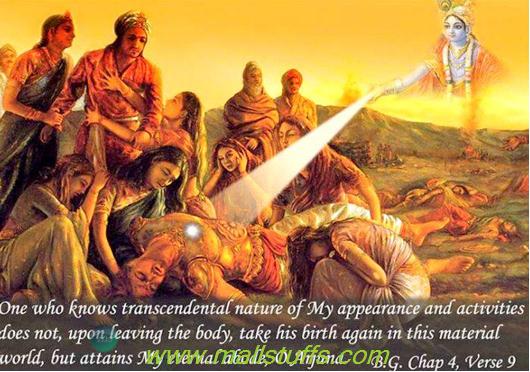
Karma
Karma means deeds or action. Our life is governed by laws of karma (Cause effect law). The karma we do in our current life not only decides the fate of our current life but also the destiny of our next birth. More the good karma you do in this life, more the virtuous living you get in your next birth. Karma is the absolute total of all your actions and the balance decides your future. Karma is best described by the English phrase “As you sow, so shall you reap”. If you sow righteousness, righteousness is what you will get. If you sow evil, you will reap evil.
<>
Avatar of god
Hindus believe in the incarnation of supreme god in human form for the establishment of righteousness and destruction of evil. For Ex: Avatars of lord Vishnu, Lord Rama and Lord Krishna were born to kill Demon ‘’Ravana’ and ‘Kamsa’ respectively to put a full stop to their tyranny. Similarly, Avatar/forms of lord Shiva like Goddess Durga, Goddess Kali and Lord Hanuman are born to kill various demons like ‘mahisasur’, ‘Raktabeej’ etc.
According to Bhagavad gita, God is born in every yuga for the establishment of truth and righteousness. Below is the verse
Yada yada he dharmasya
glanir bhavati Bharata
abhyuthanam adharmasya
tad atmanam srijami aham
paritranaya sadhunam
vinashaya cha dushkritam
dharam sansthapan arthaya
sambhavami yuge yuge
Tralsation:
“Whenever there is decline in religious values and increase in unrighteousness, at
that time I take birth. For the establishment of the good, for the destruction of the
evil-doers, for the enthronement of the Right, I am born from age to age.”--
Bhagavad Gita, 4:7-8
Conclusion:
This was just a basic overview on Hinduism. Concepts of Hinduism are so vast that it cannot be explained in few words, sentences, paragraphs or articles. However, I have tried to enclose all the major beliefs, philosophies and concepts of Hinduism in this single article. Rest is upto you to explore on Hinduism from other articles on this site or the articles you may come across while surfing the internet.
Note: Images used on this website
are either a production of Bhaktivedanta Book Trust(https://www.krishna.com), Iskcon
Foundation or were found in google search under "Free to use and share". If any
of the images presented here violates copyright issues or infringes anyone copyright
or are not under "Fair use", then please bring it to our notice. Read
Disclaimer for more.
Share this to your friends. One of your friend is
waiting for your share.
Related Articles
Why all gods are born in india
Should software professionals practice spirituality
Example of historic examples against present caste based system
Scientific explanation of Hindu cosmology and reincarnation
Science in Hinduism-Atmostpheric bands,earth,Heaven,hell
Matrix Series- movies based on indian philosophy
What Happens To Us After Death
What is hinduism-An overview
Why Animal worship in hinduism
Science in hinduism-Evolution in vishnu avatars part 2
Post Comment